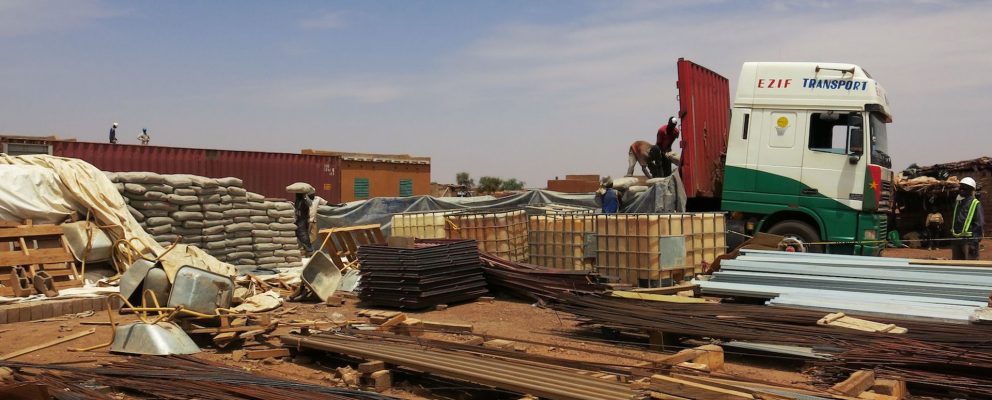Mining Shared Value works to create a more equitable and sustainable world by improving the social and economic benefits in communities and countries that choose to host mining activity.
When global mining companies source local goods and services, they unearth vital economic and social benefits for host communities.
In many resource-rich countries and regions, communities often fail to benefit from the valuable opportunities for revenue, jobs, and skills training that mining can bring. This is largely because many mining companies continue to purchase goods and services from outside host economies and far away from where mining takes place. In the worst case, there is a “resource curse” where poverty exists amidst vast mineral wealth.
Mining Shared Value works to push and empower the global mining industry, governments, and communities to increase local procurement in the host countries and communities that choose to host mining activity. Rather than focus on one mine or one community, we work to systemically change the entire sector so that local procurement increases. We provide the pressure and resources required to help the mining industry purchase more locally to create shared value between industry and host economies.
A systemic approach to improve mining local procurement, supporting more equitable and sustainable host economies.
Mining Shared Value collaborates with a diverse group of stakeholders to encourage improved mining local procurement across the industry. The venture works closely with:
- Global mining companies and their industry organizations
- International development institutions
- Canadian government agencies
- Local communities in host economies
- Standard-setters and thought leaders in responsible mining
The strategy:
Mining Shared Value equips the mining sector and its key stakeholders with tools and resources to maximize local sourcing of goods and services. This is achieved through a threefold strategy
1) As a Resource
MSV creates, compiles and distributes resources to help mining companies and stakeholders develop and operationalize local procurement policies and procedures
2) As a Hub
MSV connects industry personnel and development practitioners to create a thriving community of practice that provides a forum for discussion and inspires new local procurement initiatives (and deters duplication of efforts)
3) As a Champion
MSV promotes local procurement in the global mining sector by advocating for its inclusion in company frameworks, industry standards, and government policies and programming
The shared benefits.
According to a report by World Gold Council, the significant economic impact of mining operations means that procurement can be a major driver of economic growth in host countries. Procurement spending generally makes up the single largest expenditure of any mining operation – often greater than government taxes, employee wages, and paid salaries combined.
As well, mining companies’ annual spending on local goods and services at mine sites in developing countries often dwarfs many bilateral aid agencies’ budgets for those same areas. The potential for positive impact is enormous.
‘THE WORLD GOLD COUNCIL REPORTED THAT IN 2013, LOCAL SUPPLIERS ACCOUNTED FOR 71% OF IN-COUNTRY EXPENDITURES ($37, 402 MILLION), MAKING LOCAL SUPPLIERS THE BIGGEST RECIPIENTS OF HOST COUNTRY SPENDING BY MINING COMPANIES.’
When mining activity fosters strong upstream linkages (also referred to as backward linkages) with domestic service economies, the benefits are both mutual and multiple.
The impacts on host countries and communities:
The benefits of local procurement of goods and services for host countries include:
- Jobs, income, and tax revenue for host countries
Local procurement creates jobs has local suppliers grow and hire more staff. As businesses grow, they and their staff contribute more taxes, creating valuable resources for governments. - Technology and skills transfer to local suppliers, as well as upgrading of invaluable business skills
Mining local procurement provides important opportunities for countries to upgrade their products and services to meet the new demand driven by mining as well as technology and skills transfer. - The creation of the vital business networks and industrial clusters that are the heart of economic development
As countries and their citizens specialize, more formal business networks and industrial clusters can form.
The benefits creating for the mining industry:
Mining companies also benefit immensely from purchasing more locally. Local procurement:
- Strengthens the social license to operate.
By creating benefits for host economies and communities through local purchasing, mining companies can improve relationships with local stakeholders and governments. Delays due to community conflict or slow permit approvals can be extremely expensive. According to a Corporate Social Responsibility Initiative Report, a week-long delay for a mine with $3-5 billion in capital expenditure can result in $20 million in lost revenue. - Lowers procurement costs.
Local procurement can lower procurement costs over the long term, as products are transported shorter distances, mining companies hold less inventory, and storage and handling fees reduce as well as the cost of labour in many cases. - Improves supply chain efficiency.
Local procurement improves supply chain efficiency by shortening lead times for deliveries and increasing the resiliency of procurement systems with more options for suppliers.
Key outcomes from Mining Shared Value.
Development of the Mining Local Procurement Reporting Mechanism
In partnership with the German Federal Ministry for Economic Cooperation and Development (BMZ) through the Deutsche Gesellschaft für Internationale Zusammenarbeit (GIZ) GmbH, Mining Shared Value has developed the Mining Local Procurement Reporting Mechanism (LPRM).
The LPRM is a set of disclosures that seeks to standardize how the global mining industry and host countries measure and talk about local procurement. In most cases, procurement of goods and services is the single largest in-country payment type by a mine site, and yet to date, there has been no commonly accepted way of reporting on the issue. The LPRM helps mine sites report on local procurement to:
- Improve internal management in mining companies to create more benefits for host countries and to strengthen their social license to operate.
- Empower suppliers, host governments, and other stakeholders with practical information that helps them to collaborate with mine sites.
- Increase transparency in the procurement process to deter problematic practices such as corruption.
Founding Member and Community Manager of the World Bank’s Extractives-led Local Economic Diversification Community of Practice (CoP)
Mining Shared Value is a founding organization and currently the Community Manager of the World Bank’s Extractives for Local Content Development Community of Practice (CoP), which connects the world’s leading practitioners and experts on local procurement.
The CoP distributes research and guidance on local procurement to key global stakeholders and provides a forum for members to seek advice, pursue partnership opportunities, and to refine best practices across the themes of ELLED.
Measuring Public Reporting Trends by the Global and Canadian Mining Industries.
By reporting on local procurement industry-wide, Mining Shared Value promotes increased engagement in procurement policies and programs.
In response to these reports, many mining companies have reached out to Mining Shared Value for guidance on strengthening local procurement strategies and measurement techniques.
Our reports and publications include:
- 2015
Local Procurement and Public Reporting Trends Across the Global Mining Industry: An Analysis of Company Reporting, 2012-2013 – Canadian Mining Supplementary Edition - 2015
Local Procurement and Public Reporting Trends Across the Global Mining Industry: An Analysis of Company Reporting, 2012-2013 - 2014
Local Procurement by the Canadian Mining Sector: A Study of Public Reporting Trends[TA1]
An advisory role on best practice local procurement for mining companies.
Mining Shared Value is able to provide guidance on best-practice local procurement. This ranges from light-touch advising and presentations through to the creation and development of extensive local procurement strategies.
Creation of best practice resources
- The Relationship Between Local Procurement Strategies of Mining Companies & Their Regulatory Environments (2017) – To support Sub-Saharan African governments and their stakeholders in their efforts to increase supply chain linkages to hosted mining activity, this research focuses on the relationship between local procurement regulations and mining company practices in the South African and Namibian mining sectors. This research examines the extent to which comprehensive local procurement regulatory frameworks are effective in making mining companies purchase more locally.
- Partnerships in Procurement: Understanding Aboriginal Business Engagement in the Canadian Mining Industry (2016) – This report examines the current and best practices in Aboriginal supplier inclusion across Canada’s mining industry. From a national study, which included field visits and interviews with over eighty key informants across the industry, private Aboriginal business, and Aboriginal Economic Development Corporations, the findings in this report offer strategies to improve Aboriginal business engagement here and abroad, as well as recommendations on where to start first.
- Mining a Mirage? Reassessing the shared-value paradigm in light of the technological advances in the mining sector (2016) – This study led by the International Institute for Sustainable Development (IISD) and the Columbia Center on Sustainable Investment (CCSI) examined what impacts mining industry automation may have on local procurement and the creation of shared value more generally. The study shows the need for host country governments and mining companies to work together to reduce and mitigate potential adverse effects of automation in terms of reduced local procurement and linked employment.
- Local Procurement Case Study of Kumtor Gold Company, Kyrgyzstan (2015) – This case study analyzes the local procurement policies and procedures of Kumtor Gold Company, a wholly owned subsidiary of Centerra Gold.

